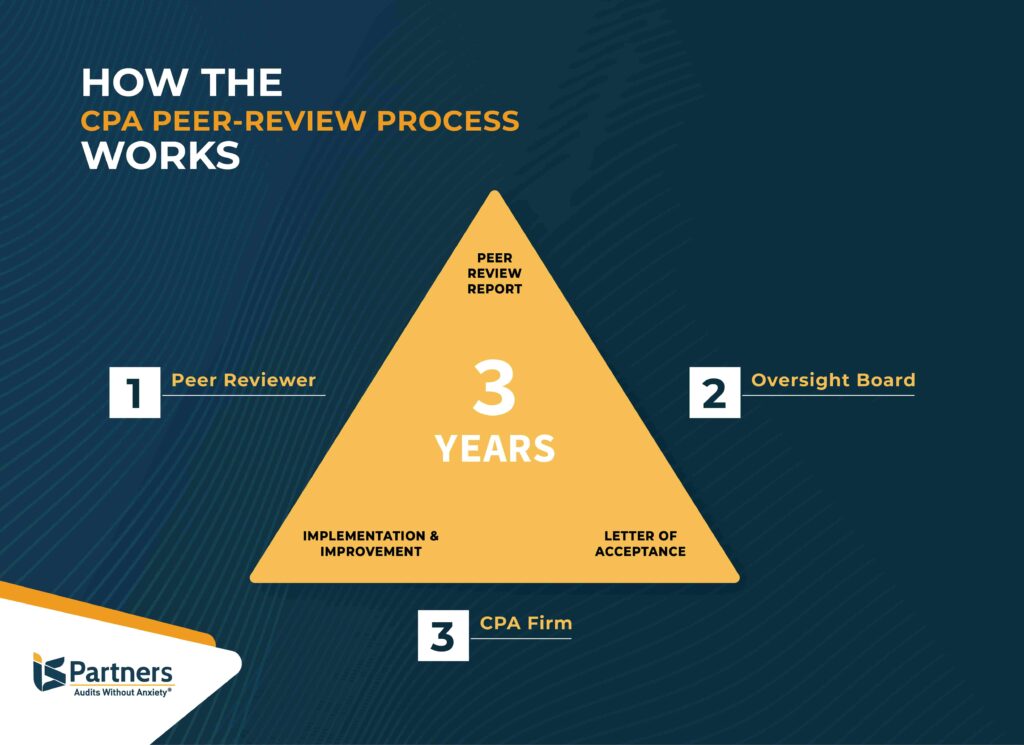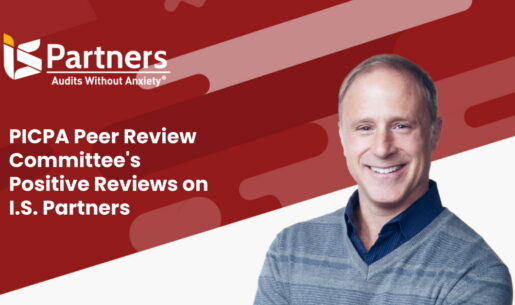Every CPA firm undergoes a comprehensive external review for quality control of audit processes conducted by leading industry experts. One of the most well-known peer-review committees for CPA firms is the Pennsylvania Institute of Certified Public Accountants (PICPA) Peer Review Committee.
Our firm is proud to announce that we have received a positive peer review letter from the PICPA Peer Review Committee. This affirms that I.S. Partners, being PICPA members, meets the high standards for quality control in our accounting and auditing practices.
“Since I.S. Partners was founded about 16 years ago, we’ve had consistent passing ratings in our peer review. Yet, even if we’re meeting the standards, we take the recommendations from trusted peers as a chance for us to continually improve our processes.” – David Dunkleberger, CPA, HITRUST CCSFP, and partner at I.S. Partners
Key Takeaways
2. The organization’s main goal is to evaluate whether an auditing firm has established an effective quality control system.
3. I.S. Partners, LLC has been recently peer-reviewed under the PICPA guidelines and has passed the evaluation excellently.
What Is PICPA?
Founded in 1897, PICPA is the second oldest CPA organization in the United States and the largest in Pennsylvania, with over 20,000 PICPA members. As part of PICPA’s commitment to excellence for future growth, member firms like I.S. Partners undergo a rigorous peer review process.
This involves an in-depth evaluation of a firm’s quality control system for its accounting and auditing work. The review is conducted every three years for active members of the AICPA. The results of the programs illustrate the firm’s commitment to excellence and ensuring public trust and respect.
What Are the Goals and Scope of the CPA Peer Review?
The overarching goal of the CPA peer review process is to evaluate whether a firm has established and correctly implemented an effective quality control system for its accounting and auditing work. This includes assessing policies and procedures across six key areas:
- Leadership Responsibilities – This ensures firm leaders emphasize compliance and ethical behavior in words and actions. For example, reviewing compensation practices to confirm they do not directly contradict ethical guidelines.
- Relevant Ethical Requirements – This verifies the firm adheres to rules of professional conduct regarding integrity, independence, and objectivity with clients. Proper training, monitoring, and disciplinary processes should be in place.
- Client Acceptance and Continuance – The firm should have strict criteria for determining which clients to take on and continue serving. Factors like the entity’s reputation, management integrity, and competence are assessed here.
- Human Resources – Hiring, professional development, advancement protocols, and engagement staffing procedures fall into this category. Firms must have qualified personnel and teams suited for each engagement.
- Engagement Performance – This encompasses adherence to applicable standards, requirements, and the firm’s own quality control procedures in conducting individual audit and attestation engagements. Paper preparation and documentation are reviewed.
- Monitoring – Comprehensive, ongoing evaluation routines to examine the firm’s quality control policies and procedures must be implemented to identify any gaps.
Firms must develop, document, and apply quality control systems spanning these elements to conform to peer review standards focused on protecting the public interest.
How Does the PIPCA Peer-Review Process Work?
The peer review process for CPA firms is a thorough, multi-step system designed to evaluate the adequacy and proper implementation of a firm’s quality control policies and procedures. This process aims to protect the public interest by helping to ensure accounting firms provide reliable, high-quality services that adhere to industry standards.
As David describes it, “It’s a triangle review.” Essentially, three key players work together to conduct the review and make the final determination on whether a firm passes:

- Peer Review – The firm being reviewed chooses another CPA firm to come in and scrutinize its quality control system. This reviewer tests policies and procedures across ethics, engagement performance, and monitoring. The report then summarizes the reviewing firm’s assessment, including deficiencies and suggestions, if any, for the firm to act upon before the next review. Feedback might include suggestions and pivotal insights on making things more efficient or documenting things more thoroughly.
- Review Oversight – An independent state or regional CPA group makes the ultimate ruling by examining the peer review findings and firm responses. Their Letter of Acceptance confirms whether the firm passes or fails their review.
- Implementation and Improvement – With the Letter of Acceptance, the firm is given an informal document with suggestions for improvement. From there, the CPA firm is expected to fix any deficiencies found by the review and consider implementing the recommendations provided by the reviewers and/or review board. The goal is to create a cycle of continual improvement.
This multi-layered effort aims to uphold benchmark quality and performance across accounting work crucial for public and private sector clients.
Scoring
It is a pass/fail reading; essentially, the peer review firm that reviewed the CPA firm writes your letter. It’s an ordinary opinion letter on whether the results were passing, passed with deficiencies, or failed – those are the three levels.
Obviously, we want a pass rating, but deficiencies are not the worst result because you can still alleviate deficiencies and clear those before the next review.
Valid Time Period of PICPA Review
The review is valid for three years. After this, the firm must undergo another cycle of peer review. This time frame is sufficient for a firm to catch up with the latest innovations and anticipated trends and implement stronger security.
Peer Review Report
The firm being reviewed can choose the firm that will conduct the peer review, and if that’s not possible because another firm is not available, then the AICPA will appoint a firm for you. At the end of their analysis, the reviewing firm produces the Peer Review Report, simply a synthesis of the reviewer’s opinion of the firm’s quality control procedures.
Letter of Acceptance
Quarterly, each peer review board meets to review the results and documentation from the reviewer. In our case in Philadelphia, this is the Pennsylvania Institute of CPAs. Then, assuming everything is satisfactory. This letter confirms that a firm has passed its peer review.
How Much is the PICPA Membership Fee?
The membership fee for this organization varies depending on an aspiring member’s standing and profession. The PICPA membership fee ranges from free to approximately $410 for associates and certified public accountants.
Check out PICPA’s membership fee rates here and join leading industry experts.
Is Peer Review Mandatory?
A peer review is required for firms working with licensing, auditing, compilations, certifications, and other requirements. Generally, a firm must undergo a peer review every three years.
What is the significance of the peer review process for CPA firms?
A positive peer review demonstrates a CPA firm’s efforts to perform work of the utmost quality. It assures clients that the firm has the experience, controls, and procedures to handle financial information accurately and ethically.
Choosing a peer-reviewed firm like I.S. Partners reduces risk and inspires confidence for businesses and organizations that rely on outside firms for auditing, tax preparation, and advisory services.
“Peer review helps to monitor a CPA firm’s accounting and auditing practice (practice monitoring). The goal of the practice monitoring, and the program itself, is to promote quality in the accounting and auditing services provided by the AICPA members.” – AICPA Peer Review Summary
As a firm peer-reviewed with positive results by PICPA, I.S. Partners affirms our dedication to maintaining the highest quality, accuracy, and ethics in serving our clients. We look forward to building on this achievement in the years ahead.
Hire a CPA Firm That’s in Good Standing
Typically, a prospect or potential client will ask us for a copy of the letter, and we’ll send that to them.
“Yet, it is possible that a company unknowingly engages a firm that is not in good standing or hasn’t passed its peer review,” explains David.
He adds, “I suspect many companies do not know that the peer review process exists and that a CPA firm is subject to a qualifying process. This is especially true for smaller businesses and startups. They may not know that the peer review process is in place.”
What Should Clients Look for When Engaging a New Firm?
Due diligence to avoid this situation would be for the company to ask for a copy of the peer review letter for any firm they are considering hiring. The firm’s standing should also be published on the state Board of Accountancy website where the firm is licensed.
In our case, that would be Delaware and Pennsylvania. If a potential customer wants to check these results, they should be able to find them by searching for the name of the firm on the state’s website.
Why Is It Essential to Rely Only on Peer-Reviewed Firms?
Selecting a CPA firm that has undergone and passed peer review is essential for reducing risk and having confidence. It ensures that the firm meets stringent industry standards in capabilities, ethics, and accountability.
The peer review scrutiny qualifies firms for licensing, proving they have implemented adequate quality control policies and procedures that cover technical abilities, independence, and responsible conduct. Positive peer review results assure that a firm is committed to delivering quality work with integrity and objectivity.
“The risk is that a company subjects itself to a poorly performing SOC auditor firm, for example, and may not get the results that they expect to achieve. So hiring a CPA firm that has not been peer-reviewed properly or has deficient results can impact the service they receive,” says David.
Relying only on satisfactorily peer-reviewed CPA firms inspires confidence by affirming competence, quality assurance, oversight accountability, and a reputation for excellence to protect the public interest.
Choose Only Peer-Reviewed Firms to Handle Your Audit and Security Needs – Choose I.S. Partners
With years of experience and positive peer-review reports, our highly certified team of professional auditors at I.S. Partners can provide you with the excellent service your firm needs. Our team can help you determine which certification and audit programs your business requires and seamlessly lead you to compliance.
Our team’s approach blends innovative and new takes on modern-day technical issues. We offer auditing services for cybersecurity, healthcare, and other firms. Allow our team of experts to deal with your compliance requirements and get you certified in no time.
Call us at 215-675-1400 or request a quote to discuss your auditing needs.




